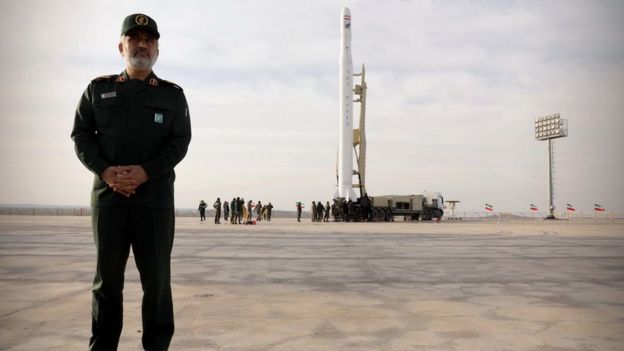Iran’s Islamic Revolution Guard Corps (IRGC) says it has successfully launched a military satellite into orbit for the first time.
The satellite, named Nur (“Light”), reached an orbit of 425km (264 miles) after being carried by a three-stage Qased launcher, a statement said.
Iran has attempted several launches in the past year that have failed.
If the success of Wednesday’s launch is verified, it seems likely to add to the tensions between Iran and the US.
Hours afterwards, President Donald Trump tweeted that he had instructed the US Navy to “shoot down and destroy any and all Iranian gunboats if they harass our ships at sea”.
He appeared to be referring to an incident in the Gulf a week ago, in which the US said 11 IRGC Navy vessels repeatedly conducted “harassing” approaches of six US Navy and Coast Guard ships
Iran accused the US of giving a “Hollywood version of events” and said the US Navy had blocked the path of an Iranian ship earlier this month.
A spokesman for the Iranian armed forces criticised Mr Trump’s tweet, saying that “instead of bullying others” the US should focus on “saving the contingent of their [armed] forces that has been infected with coronavirus”.
The countries came close to war in January, when the US killed a top IRGC general in a drone strike in Iraq. Iran responded by launching ballistic missiles at Iraqi military bases hosting US forces.
- Iran ‘developing nuclear-capable missiles’
- Iran nuclear crisis in 300 words
The IRGC said Wednesday’s satellite launch from the remote Central Desert would “be a great success and a new development in the field of space for Islamic Iran”.
Footage broadcast by state TV showed the Qased carrier inscribed with a verse from the Koran that Muslims often recite when going on a journey: “Glory be to Him, who has subjected this to us, and we ourselves were not equal to it.”
IRGC Aerospace Force commander Brig-Gen Amir-Ali Hajizadeh said the Qased “used a compound of liquid and solid propellants” and declared: “Only superpowers have such capability and the rest are just users of such technology.”
 Â Â Â Â Â Â Â Â Â Â Â Â Â The IRGC said the satellite was carried into orbit by a three-stage Qased launcher
             The IRGC said the satellite was carried into orbit by a three-stage Qased launcher
Iranian Telecommunications Minister Mohammad Javad Azari Jahromi congratulated the IRGC on the “great national achievement” and stressed that the Aerospace Force’s space programme was defensive.
“Part of Iran’s peaceful [space] programme is civilian which is pursued by the government, while another part is for peaceful defence purposes and naturally carried out by the armed forces,” he tweeted.
There was no immediate comment from the Trump administration, but it has expressed concern in the past that the technology used to launch satellites could help Iran develop intercontinental ballistic missiles (ICBMs).
It has said such launches therefore violate a UN Security Council resolution, which calls upon on Iran not to “undertake any activity related to ballistic missiles designed to be capable of delivering nuclear weapons”.
Iran has denied violating the resolution and insisted that its space programme is entirely peaceful and that it has no intention to develop nuclear weapons.
The same resolution endorsed a 2015 nuclear deal between Iran and world powers that US President Donald Trump abandoned two years ago, saying it was flawed.
A Pentagon spokesman told the Associated Press on Wednesday that the US would continue to “closely monitor Iran’s pursuit of viable space launch technology”.
“While Tehran does not currently have intercontinental ballistic missiles (ICBMs), its desire to have a strategic counter to the United States could drive it to develop an ICBM,” Maj Rob Lodewick said.
In February, Iran failed to put into orbit the Zafar communications satellite.
There were two other failed satellite launches last year, as well as a mysterious explosion that destroyed a satellite launch vehicle
Source: www.bbc.com
.


